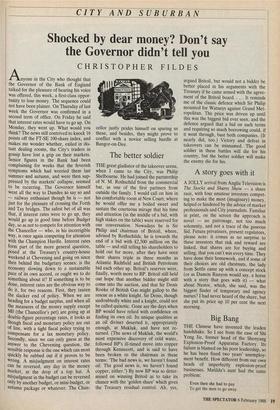The better soldier
THE great gladiator of the takeover arena, when I came to the City, was Philip Shelboume. He had joined the partnership of N. M. Rothschild from the commercial bar, as one of the first partners from outside the family. I would call on him in his comfortable room at New Court, where he would offer me a boiled sweet and sustain the courteous mirage that his time and attention (in the middle of a bid, with high stakes on the table) were reserved for our conversation. Nowadays he is Sir Philip and chairman of Britoil, where, advised by Rothschilds, he is towards the end of a bid with £2,500 million on the table — and still telling his shareholders to hold out for more, after they have seen their shares triple in three months as Atlantic Richfield and British Petroleum bid each other up. Britoil's reserves were, finally, worth more to BP. Britoil still held out hope that another bidder might still come into the auction, and that Sir Denis Rooke of British Gas might gallop to the rescue as a white knight. Sir Denis, though undoubtedly white and a knight, could not be called quixotic. Gone are the days when BP would have relied with confidence on finding its own oil. Its unique qualities as an oil diviner deserted it, appropriately enough, at Mukluk, and have not re- turned. (The news of Mukluk, the world's most expensive discovery of cold water, followed BP's ill-timed move into copper through Kennecott, and is said to have been broken to the chairman in these terms: 'The bad news is, we haven't found oil. The good news is, we haven't found copper, either.') By now BP was so deter- mined on winning Britoil as to take its chance with the 'golden share' which gives the Treasury residual control. Ah, yes, argued Britoil, but would not a bidder be better placed in his arguments with the Treasury if he came armed with the agree- ment of the Britoil board. . . . It reminds me of the classic defence which Sir Philip mounted for Watneys against Grand Met- ropolitan. The price was driven up until this was the biggest bid ever seen, and the defence argued that a bid on such terms and requiring so much borrowing could, if it went through, bust both companies. (It nearly did, too.) Victory and defeat in takeovers can be misnamed. The good soldier in these battles will die for his country, but the better soldier will make the enemy die for his.


















































 Previous page
Previous page